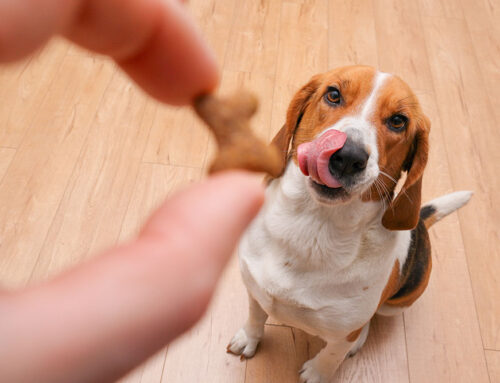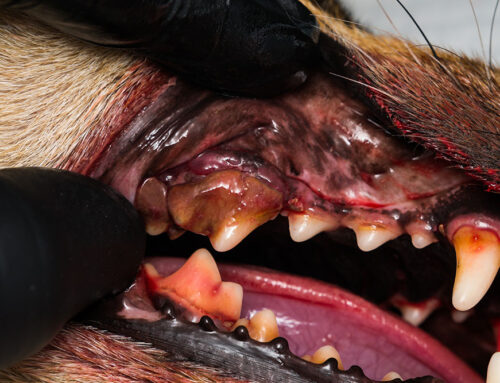Pet owners strive to provide the best for their furry companions, and that includes maintaining their overall health, right down to their pearly whites. One crucial pet care aspect that often goes overlooked is oral health. Just like in people, dental issues in pets can lead to pain, infection, and a decreased quality of life. However, you have a powerful ally in the battle for your pet’s oral wellbeing: dental diets.
Dental diets, a scientific innovation in pet nutrition, go beyond the ordinary kibble, offering a strategic approach to tackle plaque and tartar buildup. Join our North Bay Veterinary Dentistry team as we delve into the world of dental diets, dissecting the practical advantages that make these foods key to responsible pet care.
What are dental diets for pets?
Dental diets are specially formulated pet foods designed to promote oral health. Unlike regular pet diets, these foods go beyond mere nutrition; they are crafted to address specific dental concerns. These diets typically have a unique texture, shape, and composition that contribute to reducing plaque and tartar buildup, preventing dental problems such as gingivitis and periodontal disease.
What are the benefits provided by dental diets for pets?
Dental diets provide myriad perks for your four-legged friend, and several for you as a pet owner. By feeding your pet a dental diet, you’ll both enjoy:
- Reduced plaque and tartar buildup — Dental diets are formulated to be abrasive to the teeth, providing a natural brushing effect as your pet chews. These foods help remove plaque and tartar from your pet’s teeth, slowing dental disease’s development and progression.
- Improved gingival health — Healthy gums are vital for overall oral health. Dental diets often contain ingredients that support gum health, helping prevent inflammation and gingivitis. By promoting healthy gums, these diets contribute to a strong foundation for your pet’s teeth.
- Fresh breath — One of dental diets’ most noticeable benefits is their impact on your pet’s breath. Plaque and tartar reduction means fewer odor-causing bacteria, resulting in fresher breath—a win for both you and your furry pal!
- Dental disease prevention — By regularly feeding your pet a dental diet, you can significantly lower their periodontal disease risk, which, if left untreated, can lead to pain, tooth loss, and systemic health issues.
- Customized nutrition — Dental diets are carefully formulated to not only address oral health but also provide the necessary nutrients for your pet’s overall wellbeing. They are a balanced and complete diet, ensuring that your pet receives the nutrition they need while supporting their oral health.
How do dental diets differ from regular pet diets?
Diets formulated for specific conditions, such as kidney disease, arthritis, or weight loss, typically have carefully calculated nutrient levels and beneficial ingredients to help alleviate disease signs and maintain optimal health. While dental diets also have special formulations, kibble design makes them truly unique and effective.
Dental diets have a distinct texture and shape that encourages chewing. This chewing action helps remove plaque and tartar, which is not a focus in regular pet diets. The kibble pieces are large and have an airy, fibrous texture that allows the kibble to maintain its shape as your pet chews. Rather than shattering upon tooth impact, the kibble in dental diets clings to the tooth, scrubbing the surface to remove plaque and tartar.
Dental diets may also contain specific ingredients, such as mineral chelators, enzymes, antioxidants, and nutrients, such as omega-3 fatty acids, which support oral health. In particular, the diets that bind the mineral normally found in saliva can significantly reduce the rate plaque turns into tartar. These diets are carefully selected to address dental concerns and promote a healthy mouth.
Keep in mind that while dental diets are highly effective at reducing plaque and tartar accumulation, they must be your pet’s main diet for maximum efficacy. Bolstering your furry pal’s diet with table scraps, canned food, and soft treats negates many of a dental diet’s benefits.
How do I choose the best dental diet for my pet?

Incorporating a dental diet into your pet’s routine is a proactive step toward ensuring their overall wellbeing. Beyond regular veterinary checkups and at-home dental care, these specialized diets can play a crucial role in maintaining your furry friend’s oral health. Consult with your primary care veterinarian to determine the most suitable dental diet for your pet, considering factors such as age, body size, and specific health needs.
A dental diet should not be the primary nutrition source for puppies, kittens, or pets who have special nutritional or medical needs. Rather than feeding these pets a dental diet, these foods can be fed as a supplemental diet or as a treat so their teeth obtain some scrubbing action to remove plaque and tartar.
Choosing an appropriate diet for your pet can be challenging, and finding one that suits their oral and overall health needs can be complicated. For help determining which dental diet would work best for your furry pal, contact our North Bay Veterinary Dentistry team.






Leave A Comment